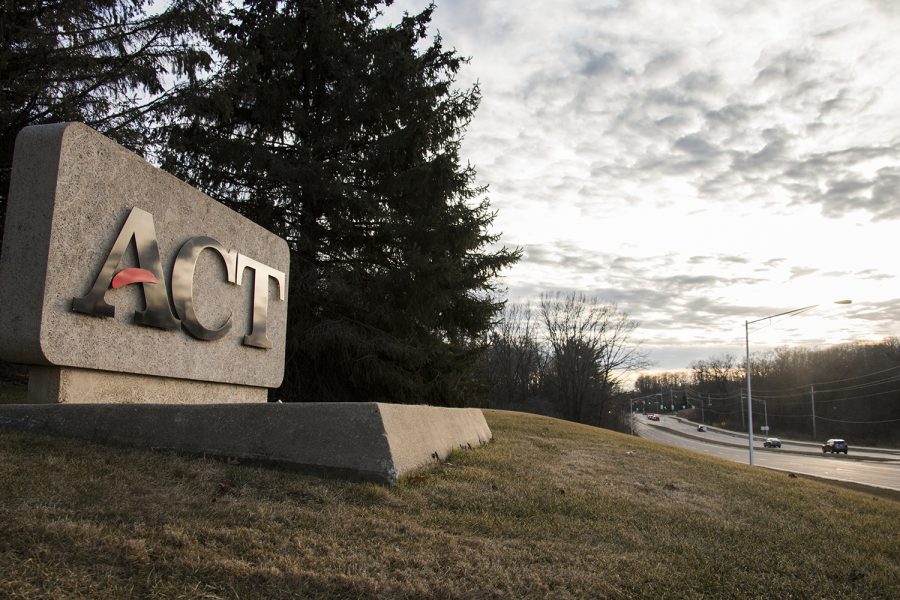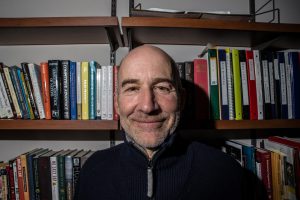ACT grant will fund program to help Iowa City schools promote higher education
The Iowa City Community School District received a grant from ACT to bring a program to the district’s secondary schools that will help encourage students to go to college.
The ACT sign is seen outside of the ACT Headquarters on Monday, March 5, 2018.
November 14, 2018
Funding from a national testing service will help Iowa City schools create a culture that officials hope encourages all students to pursue higher education.
ACT granted the Iowa City School District a three-year commitment totaling $310,000 for the district to implement the Advancement Via Individual Determination Program to all secondary schools in the district. Schools partnering with the nonprofit gain access to a host of resources, professional development for educators, and continued support to encourage college and career readiness among students.
After incorporating AVID into the curricula at Kirkwood Elementary in 2016, district officials decided to expand the program to more schools. AVID gives schools the tools to prepare students for life after high school, creating a college-going culture, said Diane Schumacher, the School District director of curriculum, instruction and testing.
“Whether students elect to go on to college or not is completely up to them, but we want them to have that option and not get to the end of high school and feel like that door has been closed for them,” Schumacher said.
To expand the program, the School District needed funding, Schumacher said.
The Iowa City School Foundation, a program that raises money for the district through different sponsors and events, searched for a partner in funding the expansion of AVID. Schumacher said the foundation contacted ACT with a proposal of what the district needed to fund the program and where specifically the money would go.
ACT responded by giving the district $310,000, extended over three years.
Most of ACT’s three-year commitment will fund professional development for teachers to be able to meet the needs of the students, Schumacher said. The rest will pay for materials and an AVID membership to use the nonprofit’s resources.
RELATED: Field testing has Community Internet Project hopeful
“We are just really pleased with the support from ACT. Often when you look at grants, it’ll be a one-year to get it off the ground, but those recurring costs are there,” Schumacher said. “We are just really pleased that we know for the next three years, we will have the support to continue promoting and implementing the program.”
In the fall of 2019, an AVID elective will be offered to incoming freshmen at each high school in the district. There will be an application process and criteria to identify those with lower GPAs, potential first-generation college students, and students belonging to groups that are underrepresented on college campuses, Shumacher said.
The application will target the School District’s efforts to find students who may benefit most from the course, she said.
In the future, the district will expand AVID to all middle schools and a few more elementary schools. Over the course of the next three years, there will be a sophomore-, junior-, and senior-level AVID elective added as well, Schumacher said.
RELATED: UI faculty help train teachers to handle LGBTQ issues
With AVID, teachers create lesson plans that incorporate Writing, Inquiry, Collaboration, Organization and Reading, said Renee Person, the AVID district director for the district.
“One of the things we have noticed is when we create those [Writing, etc.] lessons, we use more nonfiction lessons students can relate to,” Kirkwood Elementary Principal Anita Gerling said. “When they see themselves learning and they are interested in the topic, students are much more engaged.”
Promoting a growth-mindset and letting students know college is an option for them is the main goal of bringing AVID to the district, Person said.
“Far too often, students who are at-risk don’t even see college as an option,” she said. “We are closing that accessibility gap, and we want to continuously grow our teachers and support them in supporting our students.”






